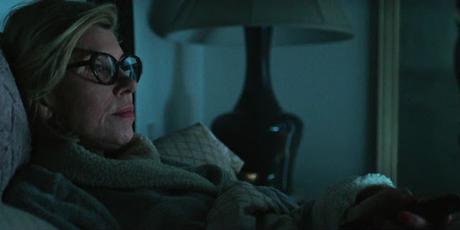We're living in a time of farce, not tragedy.

I came into this season with two distinctive conversations in mind. One started with a question about singular, outstanding performances. In my mind, I answered it immediately with examples of singular performances by actresses in films where they were, for the most part, entirely alone, not grounded in an ensemble. Maybe that is just the result of a lazy mind finding an answer to a hard to answer question – it is much easier to recognize the accomplishment of Michelle Williams in Wendy and Lucy, or Adepero Oduye in Pariah, or the protagonists in most of Olivier Assayas’, Christian Petzold’s and Claire Denis’ films (or Jennifer Lawrence in Winter’s Bone, or Maren Eggert in Marseille), than to pick out someone in an ensemble doing something truly outstanding that elevates them beyond their surroundings. On the other hand, it is probably more a personal preference for films where such singular performances come from actors and actresses playing characters that are, on some deep and profound level, alone. The context of this is also that I’ve been watching both Jane the Virgin and One Day at a Time over the past few months, which are both shows that stand on the opposite side of this. Where the characters in the aforementioned films are profoundly alone and within themselves, the characters in these two shows constantly evolve and develop in the context of family. When conflicts arise and threaten to tear individual characters apart, the solution always brings them back into the fold. The source of meaning, and to an extent, identity, for the main characters in these shows, is always family. It’ the exact opposite of Six Feet Under, where characters develop, if anything, in opposition to their family, where they develop identities in a struggle against someone else, where the answer to the question of whether “everybody dies alone” always hovered, threatening to be resolved either way (in the end, I think, the answer was “no”, but the path there isn’t easy).
So how does that connect to this season The Good Fight, an ensemble show, defined by brilliant individual performances that come together beautifully? I think that in spite of being an ensemble show, and in spite of the friendships that exist on the show, the characters are on some profound level, alone. And in this season much more than the previous one, the show finds moments to showcase that loneliness, and weaves it into the fabric of the story. The most obvious example of this is Diane’s tentative relationship with reality. There are so many scenes where she sits in a dark room, staring at a television screen in disbelief, losing the ability to tell apart actual news and fake news that her mind comes up with. It’s one of the main points this season makes, that in a world where it becomes impossible to apply logic and reason the question of whether a particular headline sounds real or fake, it also becomes very hard to make judgements about your own state of mind. Without Kurt, or anyone else anchoring her, Diane seems to lose her grip on reality. She changes her opinion that the law is, or at least should be, a stable column. She sometimes comes close to asking the question of whether she is suffering from an illness, if there is something literally breaking down in her body, but she never really shares that with anyone else, because as so many seasons of The Good Wife have taught us, any sign of weakness will usually be used against you. In a very real way, the news cycle, and the absurdity of politics in 2018, have uprooted and destabilised her, and there is nothing she can cling to. Lawyers are being murdered (Marissa finds a deck of cards on sale on an “Alt-Right” website that puts targets on each of the name partners’ backs), the news that President Trump is keeping a pig in the Map Room in the White House sounds plausible, a couple opposite her apartment keep dancing around and fucking in Trump masks. Which parts of this are real and fake has become impossible to distinguish, especially because we, the viewers, are trapped in Diane’s perception in those moments. There is no way of fact-checking reality anymore. The one thing to cling to is Diane’s laughter – a counterpoint, an admission that the only way of dealing with this four-year-situation that is reprogramming the body politic like a virus is admitting to the hilarity and absurdity of it all. And maybe keeping a gun in your desk drawer.
Diane is becoming unstable because she is losing the certainty of the law (after also losing her life’s savings, her old partner Will, and Kurt, for now) – Maia’s struggle this season is figuring out how to live after the scandal of her father deciding to flee the law, and leaving her to deal with the fallout. Her mother is in prison, the FBI is investigating her (and until the trial she is under house arrest, wearing a leg bracelet). Her new life barely resembles the old one, now that all the luxuries of having a rich family have disappeared. There are two terrible moments in the first half of the season for her that determine her actions going forward. The first happens when Amy is called to the stand during her trial, without warning her first, and publicly shares her uncertainty about Maia’s motives regarding her father’s fund, stating that she thinks Maia confirmed that the fund was in trouble when she didn’t allow Amy’s father to invest, and that Maia’s marriage proposal may have been an opportunistic ruse to keep Amy from having to testify. This is someone she has lived with for – three or four years – someone she goes home to every night. The way the betrayal and the uncertainty creep into their intimate life resembles how Diane loses her grip on reality when she watches TV alone – all of a sudden, there is no clear distinction between real and fake anymore. Something that should be certain, and stable, has crumbled, and there is no way of fixing it. The show doesn’t give Amy any space to explain herself, and she isn’t exactly a fully fleshed out character here, but the impact on Maia is massive. She won’t clearly state that this is what happened - a sense of betrayal – and instead, it just leads to more moments where the two of them seem ill-matched. Maia develops a friendship with Marissa that Amy, because of Marissa’s impulsive boyfriend, disagrees with. Maia becomes hyper-aware of every time that she makes a decision because of Amy, and then begins making her own decisions. And, in the end (of the seventh episode), she cheats on her, because “Sometimes I want stability, and sometimes I don’t”. It’s the culmination of the other drama in her life, her father betraying her so profoundly that he would choose his own freedom over that of his wife and his daughter, living with Maia’s old tennis teacher (who, to make things even more complicated, she used to have a crush on). With every certain thing breaking down, the only thing remaining for Maia is to try and redefine herself in the new situation, and reconfigure her life.
And just as an aside here that doesn’t really fit in well, but one of my favorite examples, because she is maybe my favorite character, is stoic Lucca Quinn, who realises she is pregnant from a one-time fling with previous boyfriend Colin, and refuses to share this with anyone, even when her pregnancy is already obvious to everyone, not even with friend Maia (which is significant because the tentative way in which their friendship came into existence was such an important part of the first season). Family is definitely not a way in which Lucca finds her identity, if anything, Colin’s family attempting to take ownership of that pregnancy is an awkward and terrifying burden that she refuses to bear.
In both these story lines, the greater political point the show makes about old certainties falling apart, boundaries between real and fake breaking down, and trust becoming a concept that no longer applies, fit in with what happens in characters’ personal lives. The firm itself deals with the fall out of the election constantly, explicitly when the Democratic Party requests that they develop a strategy for impeachment for the hypothetical situation that the Democrats win majorities in both Houses in 2018. Diane and Adrian start arguing the point that they have to rely on the law and precedent, but then the new partner – Liz – realises that the only way to win against other firms is to present a point that nobody would argue, which is that the reality of politics has changed so radically that none of the old principles apply, and that the only way to win this game is play it according to these new rules. She is opportunistic, and maybe a realist, but the main point here is that Diane comes to share her views.
This second season of The Good Fight asks how to navigate a world that has become unrecognisable, absurdly terrible, a farce – and for now, there is no togetherness or unity in the answers that the characters find for themselves.
2016-, created by Michelle and Robert King, starring Christine Baranski, Rose Leslie, Cush Jumbo, Delroy Lindo, Sarah Steele, Nyambi Nyambi, Erica Tazel, Audra McDonald.

